- Administrator
- Albums and Singles
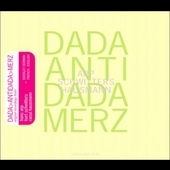 Describing Dada is a paradox, like a proverbial wet fish in the palm of your hand certain only to be lost in an attempted securing grasp. As Greil Marcus details in Lipstick Traces, subsequent efforts in art and music contain echoes from Zürich, Berlin and elsewhere; not least the urge (first and foremost) to destroy, or as Orange Juice sang: to rip it up and start again.
Describing Dada is a paradox, like a proverbial wet fish in the palm of your hand certain only to be lost in an attempted securing grasp. As Greil Marcus details in Lipstick Traces, subsequent efforts in art and music contain echoes from Zürich, Berlin and elsewhere; not least the urge (first and foremost) to destroy, or as Orange Juice sang: to rip it up and start again.
This collection features early sound poetry by (Hans) Jean Arp, recorded in 1961, the mind-bending "Anna Blume" and "Ursonate;" the only merzpoems Kurt Schwitters recorded (from 1932); and several stunning efforts by Raoul Hausmann, recorded by Henri Chopin in 1956-59. Dada rejected a nonsensical war and a seemingly complicit society, so sadly these sound poems make topical sense. They can't sever the head of the faulty puppet President of the United States or obliterate the pervading moronic bastard culture which he so ably represents, but they articulate the impetus.
When listening to non-English words in song, I often feel happily ignorant, lest they be a thinly disguised travel commercial, some government-approved triteness or an ode to domestic submission. Stories of Arp spark an urge to learn German. While the law insisted he be called Jean in 1915 France, Hans Arp's response to being drafted into the German army is a work of art in itself. He wrote the date in all spaces on the forms before adding them like a sum. Then, naked, he handed in his paperwork and was sent home. A friend of Tristran Tzara, Arp was a founding member of Dada in Zürich, and in 1920 he set up the Cologne Dada group. His work was featured in the first exhibition of the Surrealist group in Paris before he founded the Abstraction-Création movement and the periodical, Transition, and created reliefs and murals in the US and sculpture in Italy. Musically, his flat voice sometimes fails to ignite the text, and so the mischievous spirit of bemusement is absent. After a disappointing opener, his second effort, "Die Wolkenpumpe" is a measured rant; like a demented husband listing imagined slights to his wife in an unsettling monotone ("and on Thursday 23rd you did bring me herring in cream rather than in the white wine sauce as per my written request.") Next, "Dada Sprüche" seems to be some list of what Dada is or isn't: a blank prescription eaten then regurgitated as a map with instructions not to follow. Arp's moments of gnawing intensity may please in short exposure rather than when heard all in one sitting. Eventually my interest resembled someone stuck in a lecture comparing the reliability of traffic density forecasts to those of pension plans, a scantily-clad darling reclining in a room tantalizingly close by with fresh fruit, favorite vinyl, bread and wine.
Kurt Schwitters transcended medium and genre: Dada, Constructivism, Surrealism, poetry, sound, painting, collage, sculpture, and typography. It can be argued that he invented what would later be termed installations. One legacy is his Merz works—art pieces built up of found objects; the largest of which are constructions called Merzbau. According to Schwitters, merz is derived from the name of the Commerzbank; though the word is also notably similar to the French word merde. In 1937 Schwitters fled to Norway, and in the same year, his Merz pictures were included in the Nazi exhibition of degenerate art. He created Merzbau in Oslo, on the Norwegian island of Hjertoya, and after his internment on the Isle of Man, he moved to the Lake District of England, where, in 1947, he began work on the last Merzbau, the Merzbarn. One wall of this final structure is now in the Hatton Gallery and the shell of the barn remains in Elterwater. Since forgeries of his collages turn up regularly on Ebay, bidders might seek advice from the Kurt Schwitters Archive at the Sprengel Museum in Hanover. The inclusion of his two recordings on this disc is a treat for the imagination. Schwitters' speech patterns exude a playfulness and awareness of actual sound less evident in Arp's tracks. One man's cannibalism is another's homage: Brian Eno sampled Ursonate for his track "Kurt's Rejoinder;" Japanese musician Merzbow took his name from Schwitters; Colin Morton has written poetry and drama inspired by Schwitters; and Michael Nyman's opera Man and Boy: Dada fictionalized Schwitters' time in London. The German hip-hop band Freundeskreis quoted from his poem in their hit single "ANNA."
Raoul Hausmann, an Austrian sculptor and writer, was the cofounder of the Berlin Dada movement in 1917, and the creator of photomontage: though other sources cite The English photographer Henry Peach Robinson. Hausmann painted "Tatlin at Home" in 1920 then gave up painting in 1923 and became more interested in various experimental photographic procedures.
His wild contributions to this disc are very enjoyable. "BBB" sounds equal parts curse and the calling in of the cat for his tea. His stuttered busted machine gun intonations foretell frustrated pop-rebellion ("why don't you all f-f-f-f-ade away..."), his eerie shrieks, unhinged mumbling and gurgling, never sound merely nonsensical even when resembling the water spiraling down a flushed toilet. I have no real idea what is going on, whether it was spontaneous, scripted or rehearsed and his spirited efforts make such a question unimportant. Hausmann seems to be reading backwards on "K Perioum," to be involved in a study of his own breath during "Offeah" and elsewhere lurches from trilling insanity, call-and-response guttural phrasing, vaguely Arabic intonations, warm melodic twitters, metallic hiss, stunned yodels, heartbroken wailing, quacking, and—on "Cauchemar"—the shocking contrast of mere singing. Hausmann makes translation redundant yet invests real power in the oddest of deliciously nihilistic (un)exhortations. His are words spat in the face of stagnation.
While there are ample websites devoted to the images, polemic, locations, history and influence of Dada; my favorite may be the beautiful: www.mital-u.ch/Dada from where I get the idea that Dada was less an art movement than an anti-everything, less an anti-everything than an answer to the ever topical question: What shall we do tonight?
samples:
- Hans Arp - In Automobilen Reich
- Raoul Hausmann - BBB
- Kurt Schwitters - Ursonate
Read More
- Administrator
- Albums and Singles
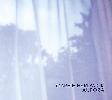 Captivating from start to finish, this latest Low Point CDR is perfect coming-out-of-winter listen. Like an especially slow thaw this disc seems to make everything crawl along t its own pace. The faded net curtain photograph cover art helping to coat the green trees in the distance in a chilly wrap of opaque fog. This one man and guitar effect pedals three tracker carves a pleasant little niche out of the currently massive drone renaissance thats sweeping the world.
Captivating from start to finish, this latest Low Point CDR is perfect coming-out-of-winter listen. Like an especially slow thaw this disc seems to make everything crawl along t its own pace. The faded net curtain photograph cover art helping to coat the green trees in the distance in a chilly wrap of opaque fog. This one man and guitar effect pedals three tracker carves a pleasant little niche out of the currently massive drone renaissance thats sweeping the world.
Aurora is one of those albums that is easy to both sink into and to delve inside. It would probably be tempting to call it Enoesque if it wasn’t such a tremendously overused cliché already. This (nearly) 17 minute long track is split into three parts which slowly fall into each other from great heights of guitar generated hum. The gaps are impossible to spot, and these programmed breaks (although invisible) don’t really seem to have any real point as this piece of music is definitely best enjoyed as a single piece anyway. Hardwick's warbling guitar lines sound more like synth sines than axe work, flooding the speakers and double coating them in glistening signal tremors.
The warm strands here move more delicately than just a simple layering or lining up exercise, the louder the volume the deeper the record gets. Occasionally the momentum melts into a unifying single swaddle of tone, "Part 2" even manages to interconnect touches of strummed string melody to the tones in a post-rock style. This CDR may not be pulling the genre into hitherto undiscovered shapes, but Aurora is a beautiful listen nonetheless.
samples:
Read More
- Administrator
- Albums and Singles
 This is a fantastic compilation that shows the range and talent that Bates is in possession of. Cold, post punk songs sit comfortably beside real English folk songs that are full of warmth. Impressively, despite covering over 25 years of his career, the different styles and periods of Bates' works still sound like they were recorded all in one go.
This is a fantastic compilation that shows the range and talent that Bates is in possession of. Cold, post punk songs sit comfortably beside real English folk songs that are full of warmth. Impressively, despite covering over 25 years of his career, the different styles and periods of Bates' works still sound like they were recorded all in one go.
Sub Rosa
With folk now being a term used loosely by many, including myself, it is important to get things straight: Bates writes songs in a proper folk style; he does not just throw an acoustic guitar into the mix and try to pass it off as some hippie jam piece of crap. Instead his songs have an ancient quality about them, sounding like they have been crafted by a few generations of singers. Songs like "Shorepoem" and "Cherry Tree Carol" are two examples of Bates' quality songwriting. There is a timelessness to these songs that is hard to capture and surprisingly the small hints of electronics used in the songs do not take away from this timelessness.
It is not just serious folky sounds that this compilation covers but the poppier end of the spectrum too. Songs like "First and Last February" and "Later War Cries" remind me of Matt Johnson's brand of pop but Bates is far from a The The clone. His more experimental efforts are also represented by an excerpt from a noisy piece called "Dissonance" from before he formed Eyeless in Gaza. This piece would sound at home on Industrial Records, which is not something that can be said of the rest of Your Jewled Footsteps.
One problem with some of the songs, mainly those from the early '80s, is that there is sometimes a severe hint of goth off them. At times Bates puts too much effort into sounding emotional on these tracks, coming off a little hysterical. However, the keyboards on all these early songs are excellent, very like those found on Joy Division's Closer which is no small complement in my book. The music and the singing improve as Bates' career progresses with the mid-'90s material definitely being the best in overall quality. Although some of the better lyrics belong to James Joyce and not to Bates, his musical arrangements of Joyce's poetry are a damn sight better than many I have heard on many a Bloomsday walking through Dublin.
Your Jewled Footsteps is a wonderful collection of songs. To the detriment of other albums that need reviewing I have been spinning this quite a lot over the last couple of weeks. It does not sound like a compilation at all; Bates' work all fits together nicely so instead of sounding disjointed like most career retrospectives it sounds more like a normal album. I cannot recommend this enough for those who are new to Bates. As for those who are familiar with his work, there are enough rare and unreleased songs here to justify the release of Your Jewled Footsteps.
samples:
Read More
- Administrator
- Albums and Singles
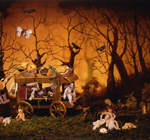 After a coincidental 17 year absence, Jackson Del Rey and Louise Bialik have revived the 17 Pygmies name, returning with a seasoned elegance, not a vengeance as might be expected from hints by both Del Rey's vigorous 2005 release I Am the Light and for a collective once noted as a reference point to a young Godspeed You Black Emperor.
After a coincidental 17 year absence, Jackson Del Rey and Louise Bialik have revived the 17 Pygmies name, returning with a seasoned elegance, not a vengeance as might be expected from hints by both Del Rey's vigorous 2005 release I Am the Light and for a collective once noted as a reference point to a young Godspeed You Black Emperor.
It's no surprise that on the whole, most music nerds don't even know much about 17 Pygmies, as their back catalogue, mainly issued only on LP, is out of print and difficult to find. The first publicly known 17 Pygmies recordings date back to 1983: the Hatikva EP was made while Jackson Del Rey was still a full-time member of Savage Republic. When he split from Savage Republic to pursue 17 Pygmies he returned to his birth name Philip Drucker and recorded three albums with Robert Loveless and a revolving cast of core and guest performers. Debbie Spinelli and Fey Ruz were part of the lineup that recorded Jedda By the Sea, a college radio favorite following its 1984 release. The followup, 1985's Captured In Ice, while at times quite dark, was moreso a pop-oriented album which may have lost more of the hardcore fans of Jedda. Joining Loveless and Drucker on 1988's Welcome was Louise Bialik, who both wrote the lyrics and sang. While Welcome had an incredible cast of guest musicians (including Brad Laner, formerly of Savage Republic and later of Medicine and Electric Company) and some moments of sheer brilliance, the spoken-word carnival type theme left a lot of people confused. Released on Great Jones, one of those short-lived Island Records independent subsidiary boutique labels (see also Indigo, Supreme Recordings, Island Red, Mango, etc,...) it was essentially their last album, only followed by a collection of material from 1988-89 titled Missyfish, which surfaced in 1991 on CD by the long defunct Nate Starkman And Son label out of Chicago.
In 2005 Philip Drucker released I am the Light as Del Rey & the Sun Kings, an album with some brutal in-your-face moments with rocking guitars and guttural vocals. It's the rare points of elegant beauty, however, like the instrumental "Rose Garden (for Saadi)" which are reminiscent of a song like "Kristalnacht" from Welcome, and perhaps it was the reception of a strong track like this which made him reconsider the 17 Pygmies thing. I'm glad he did. 17 Pygmies resurfaced in 2006 with a 7" single "Last Train"/"Mocha Polka." The A-side with its drum machine and synth recordings hints more to the pop aesthetics of Captured In Ice period while the instrumental B-side is a fiery accordion, clarinet, drum and string jam. 13 Blackbirds is far more subdued, graceful, and tender.
13 Blackbirds is the 17 Pygmies of Welcome, except there's no goofy interludes, Philip Drucker has reclaimed the name Jackson Del Rey and Jeff Brenneman (an original member of White Glove test) has joined Louise Bialik seemingly at the center of the group, once again joined by various other players of stringed instruments and singers. While first listens immediately demonstrate the fantastic piano, guitar, and vocal work, they also show the group's very calculated arrangement—like the organic/acoustic and unique soul mashing like Blood-era This Mortal Coil and Lovetta Pippen-era His Name Is Alive—subsequent repeat listens over time bring out the great strength in the songwriting. Songs like the simple guitar and vocal "Cras Amet" or the instrumental piano melody of "Ubi Sunt?" I can hear long after they're over while the string arrangement on "Lila Pausa" is out of this world. The vocals of the song "Lotus" are buried deep in echoes and reverb while prominent beats like some of the best Scala music from the '90s. The album opens with "Heavenly Intro," so "Heavenly Creatures" comes across as the album's true finale (despite being followed by four more tracks). It's got a long and patient piano tune of the same melody as the string and accordion version of the album's opener but is polished off by the voice of gospel singer Jacquie James singing "Blackbird bye bye."
After a brief pause, the group come back with a cover of the Beatles' "Blackbird," and although it's performed with the uttmost respect, I'm not sure how I truly feel about its inclusion on this LP. The guitar playing is perfect, however, and, in their defense, covering a Beatles song is a difficult task as the Beatles are so untouchable (and this isn't one of their easier songs to play). There's a fine line between doing a note-for-note cover and adding way too much uncomfortable fluff that it almost becomes a parody (see: the Beatles solo members covering Beatles songs). They didn't cross either line but I think I prefer the flow of the album to end with "Heavenly Creatures." The three following tracks are instrumental versions of earlier songs credited not to 17 Pygmies but Cult with No Name, perhaps an incarnation of the group before they decided to do a 17 Pygmies record, but they're clearly the same performers despite being noted on the back cover as "additional interpretation."
Packaged in a very Constellation Records-looking earthy gatefold cardboard sleeve, 13 Blackbirds is packaged with 13 Lotus, a CD of 13 remixes and reinventions of the song Lotus by various artists. It's filled with a couple beat-friendly takes, like the "Bum 'n Bass Drop" version by Freakshot and the hip-hop "Notorious P.Y.G." version from once 2Pac remixer Lea Reis. Jo Gabriel's sparse piano version is probably the most striking while Echo Wanderer give two echoey versions which are a throwback to the spacey dub/rock overlap that signalled the untimely end of shoegazing in the mid-'90s. It's a complete contrast to 13 Blackbirds but nothing is surprising me about 17 Pygmies now that they've surprised us all by their return.
I'm excited that 17 Pygmies have returned. In an effort that isn't unlike their Welcome album, 13 Blackbirds/13 Lotus is quite ambitious. The payoff here I feel is far more enjoyable, however. If anybody's wondering where Debbie Spinelli ended up, her creepy group the Spirit Girls also have a release on the Trakwerx label. I hope that with this Trakwerx label the 17 Pygmies back catalogue will become available again, but as the notes say in the sketchy looking 1995 CD of Jedda By the Sea/Hatikva, my guess is that some of those masters are long lost. Of course, you could always try digging around auction websites for this stuff but with the recently re-sparked interest in Savage Republic, the competition for this stuff will be fierce. With any luck 17 Pygmies are forming some sort of live ensemble, and in the age of myspace, they seem quite approachable and amicable, so a letter campaign to them probably can't hurt. (hint, hint)
samples:
Read More
- Administrator
- Albums and Singles
Sometimes we call for a vote and end up scratching our heads but this year it looks as if our readers have honestly picked some of the finest things around to cast their votes on. Once again we present the Brainwashed Readers' Poll, with results for favorite Album of the Year, favorite Single/EP of the Year, favorite Various Artist Collection, favorite Vault release, and favorite Music Video. Additionally, we have, through the magic of mathematics, calculated through your votes who the Artist of the Year, Label of the Year, and New Artist of the Year are through your vote numbers.
Album of the Year
- Current 93, "Black Ships Ate The Sky" (Durtro/Jnana)
- Scott Walker, "The Drift" (4AD)
- Liars, "Drum's Not Dead" (Mute)
- Wolf Eyes, "Human Animal" (Sub Pop)
- Little Annie, "Songs From The Coal Mine Canary" (Durtro/Jnana)
- Comets on Fire, "Avatar" (Sub Pop)
- Matmos, "The Rose Has Teeth in the Mouth of a Beast" (Matador)
- Espers, "II" (Drag City)
- Charalambides, "A Vintage Burden" (Kranky)
- Bonnie 'Prince' Billy, "The Letting Go" (Drag City)
- Jandek, "Glasgow Monday" (Corwood)
- Jessica Bailiff, "Feels Like Home" (Kranky)
- Xiu Xiu, "The Air Force" (5 Rue Christine)
- Lisa Germano, "In the Maybe World" (Young God)
- Boris, "Pink" (Southern Lord)
- Magnolia Electric Co., "Fading Trails" (Secretly Canadian)
- Rivulets, "You Are My Home" (Important)
- Whitehouse, "Asceticists 2006" (Susan Lawly)
- Andrew Liles, "The Dying Submariner" (Beta-Lactam Ring)
- Six Organs of Admittance, "The Sun Awakens" (Drag City)
- The Legendary Pink Dots, "Your Children Placate You From Premature Graves" (ROIR)
- Volcano the Bear, "Classic Erasmus Fusion" (Beta-Lactam Ring)
- Sunn O))) & Boris, "Altar" (Southern Lord)
- Rhythm & Sound, "See Mi Yah Remixes" (Burial Mix)
- Joanna Newsom, "Ys" (Drag City/Rough Trade)
- Tim Hecker, "Harmony in Ultraviolet" (Kranky)
- Boris, "Dronevil Final" (Inoxia)
- Belong, "October Language" (Carpark)
- The Matinee Orchestra, "The Matinee Orchestra" (Arble)
- Andrew Chalk, "Blue Eyes of the March" (Faraway Press)
- Beirut, "Gulag Orkestar" (Ba Da Bing!)
- The Caretaker, "theoretically pure anterograde amnesia" (V/VM)
- James Blackshaw, "O True Believers" (Important)
- Accelera Deck, "A Landslide Of Stars" (Scarcelight)
- Sandoz, "Life in the Earth" (Soul Jazz)
- Keith Fullerton Whitman, "Lisbon" (Kranky)
- Acid Mothers Temple & The Cosmic Inferno , "Starless And Bible Black Sabbath" ( Alien8 Recordings)
- Bardo Pond, "Ticket Crystals" (ATP)
- Benoit Pioulard, "Precis" (Kranky)
- Boduf Songs, "Lion Devours the Sun" (Kranky)
- Jazzfinger, "Autumn Engines" (Rebis)
- Kilgore Trout, "Two Yards Low the history of MXIII" (elseproduct)
- Michael Cashmore, "Sleep England" (Durtro/Jnana)
- Taurpis Tula, "Morden Towerings" (American Tapes)
- Charlemagne Palestine & Tony Conrad, "An Aural Symbiotic Mystery" (Sub Rosa)
- The Knife, "Silent Shout" (Rabid)
- Mogwai, "Mr. Beast" (Matador)
- Wooden Wand & the Vanishing Voice, "Gypsy Freedom" (5RC)
- Miss Violetta Beauregarde, "Odi Profanum Vulgus Et Arceo" (Temporary Residence)
- MV & EE with The Bummer Road, "Mother of Thousands" (Time Lag)
Single of the Year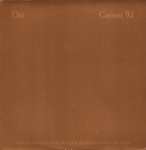
- Current 93/OM, "Inerrant Rays of Infallible Sun (Blackship Shrinebuilder)" (Neurot/Durtro)
- Jesu, "Silver" (Hydra Head)
- A Place to Bury Strangers, "Never Going Down" (Self)
- I Love You But I've Chosen Darkness, "According to Plan" (Secretly Canadian)
- Delia Gonzales and Gavin Russom, "Relevee" (DFA)
- Black Sun Productions, "Im Gegentil" (Sheela-Na-Gig)
- Fovea Hex, "Huge" (Janet Records)
- By The End Of Tonight, "The Imaginary EP" (Temporary Residence)
- Barry Adamson, "An Album Club Exclusive" (Central Control)
- Songs Of Green Pheasant, "Aerial Days" (Fatcat)
- Thee More Shallows, "Monkey vs. Shark" (Monotreme)
- Boards Of Canada, "Trans Canada Highway" (Warp)
- Aereogramme, "Seclusion" (Sonic Unyon)
- Arab Strap, "The Shy Retirer" (Self Published)
- Ensemble, "Disown, Delete" (Fatcat)
Vault Release (it's a reissue, compilation, boxed set, etc,...)
- Coil, "The Remote Viewer" (Threshold House)
- Arab Strap, "10 Years Of Tears" (Chemikal Underground)
- Coil, "Black Antlers" (Threshold House)
- John Cale, "Paris 1919" (WEA)
- Tortoise, "A Lazarus Taxon" (Thrill Jockey)
- AFX, "Chosen Lords" (Rephlex)
- Frank Tovey, "Fad Gadget by Frank Tovey" (Mute)
- This Heat, "Out of Cold Storage" (ReR)
- Tom Waits, "Orphans, Bawlers and Brawlers" (Anti)
- White Mice, "White Mice" (Basic Replay)
- Wire, "1977-1979" (Pink Flag)
- Greater Than One, "Kill the Pedagogue" (Brainwashed)
- Nurse With Wound, "An Awkward Pause" (United Jnana)
- Arthur Russell, "Another Thought" (Orange Mountain Music)
- Nurse With Wound, "Rat Tapes One" (United Diaries)
 Various Artist Collection of the Year
Various Artist Collection of the Year
- "Not Alone" (Jnana)
- "Brainwaves" (Brainwashed)
- "Killing Sound" (Razor X)
- "Wayfaring Strangers: Ladies from the Canyon" (Numero)
- "The Larry Levan Story" (Rhino)
Artist of the Year
- Current 93
- Coil
- Arab Strap
- Scott Walker
- Jesu
- Belong
- Sufjan Stevens
- Bardo Pond
- Liars
- Matmos
- Nurse With Wound
- Jandek
- The Knife
- Tom Waits
- Wolf Eyes
New Artist of the Year
- Beirut
Record Label of the Year
- Jnana (in all fairness includes Durtro Jnana and United Jnana releases)
- Threshold House
- Brainwashed (what? we're not a real record label!)
- Kranky
- Mute
- Drag City
- Important
- 4AD
- Chemikal Underground
- ATP
- Carpark
- Sub Pop
- Hydra Head
- Southern Lord
- Wackies
- Fat Cat
- 5 Rue Christine
- Matador
- Beta-Lactam Ring
- Soul Jazz
- Numero
- Secretly Canadian
- Temporary Residence
- DFA
- Ba Da Bing!
Music Video of the Year
- Boards of Canada, "Dayvan Cowboy"
- I Love You But I've Chosen Darkness, "The Owl"
- Bonnie "Prince" Billy, "Cursed Sleep"
- Delia Gonzales and Gavin Russom, "Relevee"
- Boduf Songs, "Two Across The Mouth"
- Hot Chip, "Over and Over"
- Peaches, "Downtown"
- Scott Walker, "Jesse"
- I Love You But I've Chosen Darkness, "According to Plan"
- Xiu Xiu, "Boy Soprano"
- Broken Social Scene, "I'm Still Your Fag"
- Aereogramme, "Dreams and Bridges"
- The Knife, "Marble House"
- The Threshold Houseboys Choir, "Part 1"
- Mojave 3, "Breaking the Ice"
- Adem, "Launch Yourself"
- Dr. Octagon, "Aliens"
- Jessica Bailiff, "Lakeside Blues"
- Mahogany, "Neoplasticboogiewoogie"
- Stuart A. Staples, "That Leaving Feeling"
- Mindless Self Indulgence, "Shut Me Up"
- Sigur Ros, "Hoppipolk"
- Morrissey, "The Youngest Was The Most Loved"
- Thom Yorke, "Harrowdown Hill"
- Dresden Dolls, "Sing"
Read More
- Administrator
- Albums and Singles
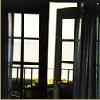 This double disc set from Jandek's live debut on US soil (August 28th, 2005) is the least entertaining of his live releases to date. The upwards quality trajectory of this documentary series seems to have faltered here due to a combination of some poor songs and an unsteadily flailing rhythm accompaniment from a duo of drummers.
This double disc set from Jandek's live debut on US soil (August 28th, 2005) is the least entertaining of his live releases to date. The upwards quality trajectory of this documentary series seems to have faltered here due to a combination of some poor songs and an unsteadily flailing rhythm accompaniment from a duo of drummers.
This isn't an especially tough listen for anyone familiar with Jandek's music; it's the same core elements of his first two live discs using a local improvisational backing crew. Unfortunately the very evident lack of chemistry between the percussionists and Jandek on most of the songs here leaves around two-thirds of this album sounding tattered and unconnected.
Lacking the obvious intuitive chemistry of the Youngs/Neilson backing, on these discs its left to Juan Garcia's electric bass to support Jandek as both Nick Hennies and Chris Cogburn on drums fail to find their improvisational feet. Instead of providing any kind of real stereo effect or exploring different sonic areas they end up merely effacing each other or blanding out into a soft mass. It's a great idea on paper, and it could have easily taken off in several directions and added another twist to his so far impeccably realised and recorded live work. Their improv credentials certainly would have made them appear like great choices to back Jandek, but this subdued splay isn't a very interesting route. The poorest material here comes over as a fumbling mush in places and in others like random cracks and bangs of players who have lost any thread they might have followed.
Along with this less inspired playing, there is a sometimes syrupy lethargic pace at work here too. Miles away from the more thoughtful and active pieces are songs like "Throw me Away" and "Lonely Dog," which are good examples of the sometimes aimless and thuddingly barren paths that this album can take. Even when Jandek and band pick up the pace with the scrabbled teen punk turn of "The Police," the drums keep the song nauseously unsteady. Only Garcia's bassline runs help to redeem the song from veering into total wreckage. This record’s themes feel that little more simplistic and easily exposed, featuring hefty doses of imagery relating to lost love, drowning of self and turning away from others. It is worth mentioning at the point that the bass lines here are more forcefully melodic than the ones Richard Youngs offered up on his shifts as Jandek bassist. Juan Garcia seems to be closely following the guitar work and almost instantly building brief melodic patterns in the wake of Jandek’s guitar shards.
Even still there is a good third of Austin Sunday that is easy to get swallowed up in. Pulling the nightmarish "Let me try Again" out of the bag for the record's closer goes a good way to redeeming this show's inadequacies. As a slice of hell-trailing blues it leaves a path of scorched footprints across the record, capturing in a 13 minute nutshell (and better than any of the three live discs have yet) the essence of the man's recorded work. His ability to build a web of incredibly 'other' narratives from experiences rooted in everyday narratives leaves me with little doubt that backed by more capable improvisers this could have been a much more assured release.
samples:
Read More
- Administrator
- Albums and Singles
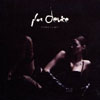 Back when many techno and electro producers operated in perpetual pseudonymity and even anonymity, the intent was to put the focus on the music and not on the people behind it, as well as to add a certain underground mystique to these rebellious sounds. Sadly, many of today's labels cannot help but exploit the secrecy behind their artists' identities, cheapening the legacy of the Underground Resistance posse and like minded artists.
Back when many techno and electro producers operated in perpetual pseudonymity and even anonymity, the intent was to put the focus on the music and not on the people behind it, as well as to add a certain underground mystique to these rebellious sounds. Sadly, many of today's labels cannot help but exploit the secrecy behind their artists' identities, cheapening the legacy of the Underground Resistance posse and like minded artists.
The Detroit pioneers whom we revere as living gods in clubs and at festivals didn't start out as larger-than-life celebrities, but their consumers' rabid obsession with unmasking and deciphering the unknown caused that to happen, an unintended consequence that I'm sure at least some of those producers are grateful for nowadays. I've read countless message board and forum discussions consisting of (mostly) young men fascinating themselves over who such-and-such act might be. I don't particularly care to waste my time trying to out Plus Device despite Hefty's buzz-seeking overemphasis of its incognito status. When marketing gimmickry this blatant is employed to sell records, while not the most heinous crime in my book, it hardly matters that the artist or artists can't or won't name names, nor does it matter why.
All that aside, the music here bumps and grinds with a fealty to the aforementioned deities. The bulk of Puncture consists of smooth, deep electro workouts with Roland X0X gear or passable emulators at their core. Opener "Pupil Measurement" jacks with snappy snares and bleepy hiccups, repeating a delayed spacey sparkle every bar. While a nice cut, it pales in comparison to "Body Heat," a vocoded funk jam that matches the pseudo-pornographic cover art. Adult themes are repeated throughout the album, though occasionally with laughable results. The lackadaisical, vulgar vocal delivery on "Sexual Harassment" makes even the most talentless Dirty South spitter sound half-decent, spoiling a perfectly good almost Drexciyan quality track. "Come Inside Of Me" atones for that misstep with a Daft Punk panache of analog flourishes and a repeated robotic voice hook.
For the most part, Puncture accomplishes more without words than it does with them. "Public Transport" melds tech-house stabs and textures with tough electro beats, offering up some compelling squiggly melodies. In a similar fashion, "Ultra Seductive" opens deeper and soulful before throwing in almost unexpectedly quirky, neck-jerking beats. After all that funk, Plus Device throws one last curveball in the finale "Refreshing, Invigorating" by belatedly adopting the 4/4 kick-snare pattern that a lesser artist might have been content to rely on throughout the album. This last laugh, if meant that way, demonstrates that, despite off-putting manufactured hype and circumstance, the spirit of Detroit cannot be destroyed.
samples:
Read More
- Administrator
- Albums and Singles
 The artwork of this split CD-R wins the award for creepy package through the post for this week. A card sleeve with scarlet stencilled skulls inside a red flecked bandage runs a close second to receiving dead rodents in a jiffy bag. Out of the three pieces here (two Robedoor tracks and the single piece by Bologna Pony), only one piece, the Robedoor finale, fails to balance on the awkward line between a riveting listen and a generic elongated feedback blow-out.
The artwork of this split CD-R wins the award for creepy package through the post for this week. A card sleeve with scarlet stencilled skulls inside a red flecked bandage runs a close second to receiving dead rodents in a jiffy bag. Out of the three pieces here (two Robedoor tracks and the single piece by Bologna Pony), only one piece, the Robedoor finale, fails to balance on the awkward line between a riveting listen and a generic elongated feedback blow-out.
Evoking dread atmospheres, the main bones of Bologna Pony’s "Witch" appear like faces in the smoke. The slightness of the ringing tones and the tension built through restraint spits the notes metal cycles and clicks of steely strings. The temptation for the duo to have let rip must’ve been near unbearable. Their decision to not rely on the wire wool grind of guitar noise allows the space for swells of vocal moan and scything single notes. The layers sinking into bitter tasting dark and the crush of rattles that echoes out into the fade of a gorgeously bleak trip.
The usually reliable Robedoor score a hit and a miss with their two contributions. On the positive side there’s "Blue Circle," which channels a fly trapped by solder in an electric circuit. Stopping just short of a burning flesh stink, half way through it leans on the steady boil until sawing jaws take the rest of the track apart like pulling spider’s legs. "Blue Surrender," on the other hand, starts like its going to be a bad impression of Sunn 0))): all smoke and the churning toll of bells but it doesn’t move on from there. Swallowing itself in weak gulps, this diet immolation seems to burn out as it circles on its own tail. With Robedoor not having had put a foot wrong previously, it's a surprise when this doesn't meet the high expectations and fails to take off. Two out of three ain't bad.
samples:
- Bologna Pony - Witch
- Robedoor – Blue Circle
- Robedoor – Blue Surrender
 
Read More
- Administrator
- Albums and Singles
 An aberration among their label mates, Silk Saw has consistently managed to operate on the fringe of the so-called rhythmic noise scene, with compelling sonic consequences. Thankfully, Ant Zen founder Stefan Alt continues to stand by the often difficult listening crafted at Laboratoire Central, collaborators Marc Medea and Gabriel Severin's enduring Brussels studio.
An aberration among their label mates, Silk Saw has consistently managed to operate on the fringe of the so-called rhythmic noise scene, with compelling sonic consequences. Thankfully, Ant Zen founder Stefan Alt continues to stand by the often difficult listening crafted at Laboratoire Central, collaborators Marc Medea and Gabriel Severin's enduring Brussels studio.
The duo's clever moniker, the soft fetishworthy fabric genetically spliced with a cold dangerous tool, could never be lost on the astute listener. Its music, while never particularly pretty, always allows for an uneasy, narcotic calm to share space with the unrelenting rhythms. Industrial in the purest sense of the word, 8 Reports doesn't diverge too much from that loose formula over the course of its eight tracks, fitting in well with such provocative Silk Saw albums as Preparing Wars and 4th Dividers, two of the finest Ant-Zen records to date.
Alt's typically brilliant artwork this time around depicts a crude, sub-Kraftwerkian mechanical man, an automaton bearing the dust and wounds of years of neglect. Such imagery immediately evinces an excellent mindset for appreciating these recordings. "Conductor" builds slowly through percussive clicks, as if mimicking how the abandoned robot might sound when finally turned on, culminating in a repeating lo-fi surge that implies a readiness to serve. Beginning with a dark ambient passage of almost clichéd sounds, "Faggoted" drops a frenetic beat, looped at an assembly line pace, surrounded by a restrained cacophony of shifting tones, bleeps, and drones. Sparks fly like white hot snares ever so suddenly around the five minute mark, teetering towards territory already covered extensively by Pan Sonic, a forgivable lapse considering the two acts are essentially contemporaries.
"Sleep Will Come" plays out like a machinist's lullaby of hypnotic hum and high-pitched ringing electronics, the sounds one might encounter trying to catch a nap in the factory's empty break room. Closer "Defeated" conjures the spectre of 2-step garage before growing in rhythmic complexity and disquieting intensity, climactically sputtering out in a series of hiss strewn delays and filters, powering down the sad contraption perhaps indefinately.
samples:
Read More
- Administrator
- Albums and Singles
It was January 1996 on the Carribean coast of Honduras. The musician in question was looking to catch a ride with a local vessel to the neighboring islands. There was one shrimping vessel in port that day, and its captain Jimmy willing to take disheveled hippies on board. He spoke some fragmented english, the boat set sail that evening. This album is dedicated to the idea of Jimmy the high-wire shrimper. Misplaced nautical charts, trade winds, shortwave miscommunication, midnight whispers, amorxxx.
Alien8 Recordings is reissuing Radio Amor, originally released on Mille Plateaux in 2002, in order to maintain the availability of the work of one of our label's most important artists. The recording has been out of print for two years now, out of grasp of Hecker's growing legions of admirers. Hecker is still basking in the universally glowing reception of this year's "Harmony in Ultraviolet" on Kranky (Score 8.7 / Best New Music on Pitchfork), the follow-up to 2004's "Mirages" on Alien8 Recordings.
Radio Amor is a key release in Hecker's discography, bridging his output between our "Haunt Me" (2001) and "My Love is Rotten to the Core" (EP, 2002) releases and 2004's "Mirages". "Radio Amor is a brilliant soundtrack for daydreaming, and Tim Hecker's effective variations on a few central ideas once again show a gifted composer at work." - Pitchforkmedia
Release date: January 23, 2007
Label: Alien8 Recordings
Read More
- Administrator
- Albums and Singles
VP Records presents the King Jammy “Selector’s Choice” collection on four double CD sets. Demonstrating the full range of styles and artists produced during the most prolific period in King Jammy’s career and dancehall in general. The track list is a who’s who of reggae on everything from love songs to hard core party tracks. The mixture of instrumentation and song themes display the popular trends and issues of the day and all contain the vital element of the King Jammy’s sound. Each CD chronicles the top tracks form the essential King Jammy’s riddims released between 1985 and 1989. Each 2 CD set comes with a track by track description written by famed reggae writer Rob Kenner, plus vintage photos of Jammy and members of the Super Power sound crew.
Label: VP Records - http://www.vprecords.com/
Read More

